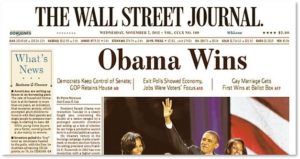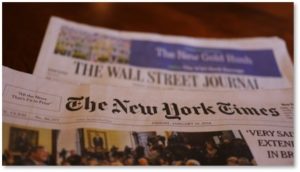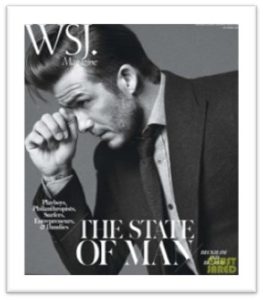I finally pulled the plug. After careful thought for a long time, I cancelled my print subscription to The Wall Street Journal.
Reading The Wall Street Journal Daily
 I did not make this decision lightly or easily. My first job out of college was working in the Advertising Sales Promotion Department of Dow Jones, then in a building that has been replaced by condominiums. Part of my job was to go through the daily paper every morning. I learned a lot and I grew accustomed to having that news at my fingertips. I could speak knowledgeably at parties and in gatherings because I had gone through the news of the world that morning.
I did not make this decision lightly or easily. My first job out of college was working in the Advertising Sales Promotion Department of Dow Jones, then in a building that has been replaced by condominiums. Part of my job was to go through the daily paper every morning. I learned a lot and I grew accustomed to having that news at my fingertips. I could speak knowledgeably at parties and in gatherings because I had gone through the news of the world that morning.
Back then, The Wall Street Journal was conservative but rational. Vermont Royster headed the editorial board. No one would have argued that the paper represented the needs of working-class people or even lower-level staff like me. Dow Jones paid us badly. We were supposed to take our salary bump when leveraged the Dow Jones experience on our resumes to get another job—which I did after three years.
Good Times, Memorable Experiences
I had some good times, worked with great colleagues and had memorable experiences. Why do I capitalize the T in The Wall Street Journal? Because it’s part of the name and I was in the room when that decision was made. I designed an eagle tie bar that Tiffany produced for Dow Jones. In my first year, I attended a Board Meeting and played a film for the Board of Directors of Dow Jones, including the daughters of Clarence Barron. This experience made an impression.
In subsequent years and in other companies, I got corporate subscriptions wherever I could and read the WSJ often. It became a habit and I depended on it. Even in the Clinton years, when the editorial pages frequently embraced hysteria and name-calling, happy to repeat every GOP insinuation of misbehavior without fact checking, I remained loyal, if not always happy.
Then things changed.
The Beginning of the End
In 2007 Rupert Murdoch, an immigrant from Australia, purchased The Wall Street Journal from the Bancroft family for $5 billion, ending their 105-year ownership. Things grew dark.
 I anticipated the Journal’s feverish coverage of the Obama presidency. After all, I had seen what a more moderate management team did to the Clinton Administration. (Shortly after Bill Clinton was sworn in, they referred to “Hillary Clinton and her coven of followers.” That’s not even subtle.)
I anticipated the Journal’s feverish coverage of the Obama presidency. After all, I had seen what a more moderate management team did to the Clinton Administration. (Shortly after Bill Clinton was sworn in, they referred to “Hillary Clinton and her coven of followers.” That’s not even subtle.)
They hated Bill Clinton not just for his policies but because he took a job they felt rightly belonged to a man from the prep-school, Ivy League elite. I knew how they would attack the first black man — Harvard Law Review notwithstanding — to defeat the chosen white male candidate. They spent eight years defaming the man who dared to defeat the candidate who had carried the power structure’s imprimatur.
The Trump Darkness Descends
Then Donald Trump was elected and things darkened further. I gritted my teeth and told myself that the quality of news coverage outweighed the editorial page’s sycophancy. That reading the good stuff made up for the hatred, deliberate mistruths, shading of the facts, and casting of aspersions on the Democrats, particularly women. That it was important to understand how the other side thought.
The strategy worked until, well, it didn’t. More and more often I noticed the news they chose not to cover—most of it having to do with Donald Trump’s many faults and the legitimate charges against him. Bret Stephens, the only editor with the guts to call Donald Trump what he is, left The Wall Street Journal and joined the New York Times. I felt like my only ally had deserted the ship.
The Final Straw — Kavanaugh
 The final straw came with coverage of Brett Kavanaugh’s appointment to the Supreme Court. It was so skewed, so tainted, so obsequious, that I could barely stand to look at the editorial page. Day after day, I found myself ignoring The Wall Street Journal and reading the New York Times and the Washington Post online.
The final straw came with coverage of Brett Kavanaugh’s appointment to the Supreme Court. It was so skewed, so tainted, so obsequious, that I could barely stand to look at the editorial page. Day after day, I found myself ignoring The Wall Street Journal and reading the New York Times and the Washington Post online.
And then it struck me: why were we paying for this very expensive subscription to a newspaper I no longer wanted to read? It was time to say good-bye.
What I Will Miss in the WSJ
I will miss a few things:
- Jason Gay’s sports coverage. It’s so well written that he got me to read articles about sports I don’t even like, such as soccer and hockey. I appreciated the clever turns of phrase and astute observations. I often laughed.
- Joe Morgenstern’s movie reviews—always good, always intelligent. I turned to his reviews first even though he frequently reviewed trendy films that never come near a local theater.
- The arts coverage: In-depth articles on museums and exhibitions around the world.
 The House Call story in Friday’s pretentious Mansion Section (that’s real estate to the rest of us). This section tells the story of a famous person’s first home and his or her rise to fame or prominence.
The House Call story in Friday’s pretentious Mansion Section (that’s real estate to the rest of us). This section tells the story of a famous person’s first home and his or her rise to fame or prominence.
In all the years they have been running House Call, very few of the subjects have come from wealth. At least one grew up homeless.
- The International coverage, especially articles about cultural changes in Saudi Arabia and China.
- The Editorial Cartoon
What I Won’t Miss
- The Editorial Page. All of it. As the late Vince Foster said, “The Wall Street Journal’s editors lie without consequence.”
 The WSJ Magazine. When I actually received this glossy publication with my paper, which was very seldom, I read little. It is a twee paean to elite privilege, mindless consumption, and luxury goods.
The WSJ Magazine. When I actually received this glossy publication with my paper, which was very seldom, I read little. It is a twee paean to elite privilege, mindless consumption, and luxury goods.
Had the articles ever suggested that readers do something with their money to help the less fortunate, the earth, medical advances, space exploration, animal welfare—anything—I might have been interested. But I found the WSJ Magazine self-indulgent, shallow and boring.
Now Available Online
I can still actually see some of these sections because we kept the Saturday Weekend Journal for the Review section and online coverage for the crossword puzzle. I think I can still read the WSJ+ email. This arrived every week with the opportunity to win a fabulous vacation at an elite resort—which I never did. Or I could buy some luxury goods I didn’t want. Or I could attend a black-tie event somewhere far away. To whoever puts this email together, nothing happens north of Manhattan and Boston doesn’t exist.
Otherwise, it’s good-bye to the daily The Wall Street Journal.
They will not miss me. I don’t have enough money to make a ripple in the world of their readers and advertisers. I’m the wrong demographic profile. My politics do not match theirs. I’m never going to purchase a Rolex Oyster or a $20 million second home.
So, I won’t be reading The Wall Street Journal with breakfast every morning. Somehow, without all the anger and accusations, I think my day will be a little bit brighter
